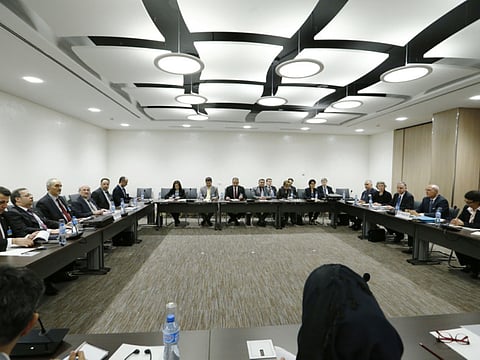US, Russia quietly debate proposed Syrian constitution
Opposition worries Obama administration dangerously bending in favour of Putin’s Syria vision

Beirut: A new round of talks have started in Switzerland this week between the Syrian Government and the opposition, under the auspices of the United Nations and the watchful eye of Moscow and Washington DC.
As Syrian negotiators debate the political future of their country, US and Russian officials are discussing the form and shape of Syria’s new constitution.
While international reporters are busy covering the new round of Syrian talks in Geneva, side talks are under way in a nearby undisclosed location in Switzerland, between envoys of presidents Barack Obama and Vladimir Putin.
The two officials — Robert Malley and Alexander Lavrentiev — are pouring over the text of a new Syrian Constitution, authored discretely in Damascus and presented by Serge Lavrov to his US counterpart John Kerry during the latter’s visit to Moscow in late March.
Syrian negotiators on both sides of the spectrum believe that for the first time in five years President Obama is serious about a Syrian breakthrough before his term ends next January.
Members of the Syrian Opposition complain that he is bending “dangerously” in favour of Putin’s vision for a solution on Syria — of course, that tilts in favour of President Bashar Al Assad.
Earlier, John Kerry asserted from Moscow that the new Syrian constitution needs to see the light by next August — just before the United States shuts down into “election mode” ahead of the presidential vote in November 2016.
The US and Russian officials are discussing a constitutional draft prepared by lawmakers in Damascus, with strong advice from Moscow, which emphasises “secularism” of the Syrian State.
This falls in line with the Syrian government’s self-portrayal as the secular protector of minorities, waging a war against Islamist fanatics, Al Qaida and Daesh.
A notable proposal for Syria’s new charter is scrapping Article 3 of the current Constitution, which says: “Islam is the religion of the President of the Republic.”
This article — criticised for decades by Syrian Christians — has been in place since 1920.
Two attempts were made at scrapping it in 1950 and 1973 but both ended in vain.
Other notable floating amendments are restoring a clause from the constitution of 1950, which makes a presidential election happen only through a Chamber of Deputies rather than directly by the people as practised since 1971.
The logic behind is that the people vote for their deputies, who in turn, choose a president on their behalf.
This was common constitutional practice back in the 1950s, when the legislative branch played a respected and powerful role in Syrian politics, and had a constitutional say in who makes it to the Presidential Palace, and was suspended in the early 1970s.
The current parliament, voted for this week inside Syria, is packed by pro-government figures who make up the lion’s share of its 250-seats.
Additionally if it does see the light, the constitutional amendment automatically prevents nearly five million Syrians living outside the country from voting in any upcoming presidential election, since according to law, Syrians in the diaspora are only entitled to vote for presidential elections, rather than parliamentary ones.
The constitutional draft keeps the presidential term at seven years and says that an incumbent can serve in office for two consecutive terms from the implementation of the new Charter.
If the Syrian Government gets its way, this means that Al Assad can run for two additional terms from whenever early elections are called for after the new constitution goes into effect next summer.
The opposition is calling for early presidential elections in late 2017, where Al Assad cannot run, but Moscow, Tehran, and Damascus insist that the presidential elections need to take place on time in 2021.
Many speculate that the two sides will meet halfway and elections will happen in 2018 or 2019.
There is nothing in the new constitution currently being debated that prevents Al Assad from running for another term, although members of the Riyadh-backed Higher Negotiating Committee of the Syrian Opposition insist that he cannot run, while Assad and his allies argue otherwise.
The current Syrian Constitution was drafted in February 2012. It kept the presidential term at seven years and vested huge powers in the hands of the president of the republic, while abolishing Article 8, a controversial clause penned in 1973 and gave the Baath Party constitutional authority as “leader of state and society”.
During the parliamentary elections of 2012, the Baath and its allies still got 168 out of the 250 seats in Parliament, and it still controls powerful posts like the premiership, speakership of parliament, in addition to the ministries of defence, interior, education, finance, in addition, of course, to the Syrian Presidency.



